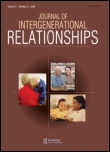
Journal of Intergenerational Relationships
Scope & Guideline
Innovating Perspectives on Aging and Relationships
Introduction
Aims and Scopes
- Intergenerational Program Evaluation and Effectiveness:
The journal emphasizes the importance of assessing intergenerational programs' effectiveness, exploring methodologies to evaluate their impact on participants' well-being and community engagement. - Cultural Perspectives on Intergenerational Relationships:
It addresses how cultural factors shape intergenerational dynamics, with a focus on diverse populations and the role of cultural identity in relationships between generations. - Impact of Technology on Intergenerational Interactions:
The journal explores how digital tools and platforms facilitate or hinder intergenerational connections, especially in contexts like education and caregiving. - Social Support and Resilience in Intergenerational Contexts:
Research often highlights the role of social support networks across generations, focusing on resilience among caregivers and the emotional well-being of older adults. - Health and Well-Being Across Generations:
A consistent focus on how intergenerational relationships impact health outcomes and psychological well-being, particularly in aging populations and their caregivers. - Intergenerational Learning and Knowledge Transfer:
The journal investigates the processes through which knowledge, skills, and values are exchanged between generations, promoting mutual learning and growth.
Trending and Emerging
- Impact of COVID-19 on Intergenerational Relationships:
Research focusing on how the pandemic has affected intergenerational interactions, caregiving dynamics, and community support systems has surged, revealing new insights into resilience and adaptation. - Digital Intergenerational Programming:
There is a growing interest in virtual intergenerational programs and the use of technology to bridge gaps between generations, highlighting innovative practices in education and community engagement. - Environmental and Social Justice Initiatives:
Emerging themes include the involvement of older adults in environmental movements and social justice, reflecting a commitment to sustainability and community activism across generations. - Mental Health and Well-Being of Caregivers:
Increased attention is being paid to the mental health outcomes of caregivers, particularly in kinship care settings, underscoring the importance of support systems in intergenerational contexts. - Intergenerational Learning in Educational Settings:
The journal is seeing a rise in studies that explore intergenerational learning frameworks within educational institutions, emphasizing the benefits of diverse age groups in academic environments. - Cross-Cultural Comparisons of Intergenerational Relationships:
Research comparing intergenerational relationships across different cultural contexts is gaining traction, providing valuable insights into how culture shapes these dynamics.
Declining or Waning
- Traditional Views on Aging:
Research that strictly adheres to traditional stereotypes and negative perceptions of aging seems to be waning, as the journal increasingly emphasizes positive narratives and the strengths of older adults. - Intergenerational Conflict Studies:
While the journal has explored intergenerational tensions, there is a noticeable decline in studies focused solely on negative interactions, shifting towards more constructive and collaborative approaches. - General Ageism Research:
There appears to be a decline in general research on ageism, as the journal pivots towards examining specific contexts and interventions to combat age-related biases. - Static Models of Intergenerational Relationships:
Studies that employ static or one-dimensional models of intergenerational relationships are less common, as the journal embraces more dynamic and multifaceted frameworks. - Localized Interventions Without Broader Implications:
Research focusing solely on localized interventions without considering broader societal implications or scalability is becoming less frequent, with a shift towards studies that inform policy and practice on a larger scale.
Similar Journals
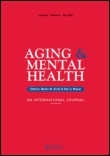
AGING & MENTAL HEALTH
Pioneering Studies in Geriatric Mental HealthAGING & MENTAL HEALTH, published by Routledge Journals, Taylor & Francis Ltd, is a leading academic journal that focuses on the dynamic intersection of aging and mental health, critically addressing issues pertinent to geriatric psychology and psychiatry. Established in 1997, this journal covers a wide range of topics including mental health disorders in older populations, cognitive decline, and social implications of aging. With an impressive reputation, it currently ranks in the Q1 category in Geriatrics and Gerontology, Gerontology, and Psychiatry and Mental Health, showcasing its significant contribution to these fields. The journal is recognized for its high-quality, peer-reviewed research and holds esteemed positions in Scopus rankings, emphasizing its relevance and impact in psychiatric nursing and gerontology. While it does not offer open access, AGING & MENTAL HEALTH remains a vital resource for researchers, professionals, and students dedicated to advancing our understanding of mental health in the aging population.

Review of Economics of the Household
Advancing Insights into Economic Behaviors at HomeThe Review of Economics of the Household, published by Springer, is a leading interdisciplinary journal that shapes the landscape of household economics with rigorous research and innovative methodologies. With an impact factor reflecting its high citation rate and significance in the field, this journal is categorized in the prestigious Q1 quartiles for both Economics and Econometrics and Social Sciences (miscellaneous) for 2023. It ranks impressively at #17/604 in Social Sciences and #67/716 in Economics, highlighting its relevance and authority within academic and professional circles. Covering a broad spectrum of topics, it seeks to provide insightful analyses regarding household decision-making, economic behaviors, and socio-economic impacts. The journal is integral for researchers, professionals, and students aiming to deepen their understanding of household dynamics in an ever-evolving economic landscape. Located in the Netherlands, and accessible through institutional subscriptions, the journal ensures that vital research is shared and disseminated widely, contributing significantly to the advancement of the field.
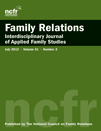
FAMILY RELATIONS
Shaping Understanding of Family DynamicsFamily Relations, published by WILEY, is a leading journal dedicated to advancing the understanding of family dynamics and relationships within the fields of Developmental and Educational Psychology, Education, Social Sciences, and Social Work. With an impressive impact factor, this journal ranks in the top quartiles across multiple categories, including being placed in Q1 for both Education and Social Work and Q2 for Developmental and Educational Psychology in 2023. Established in 1981 and converged from 1996 to 2024, Family Relations has a rich history of publishing rigorous research that informs both academic and practical applications in education and social services. Although not an open access journal, it remains highly regarded with robust Scopus rankings, emphasizing its significance in shaping policies and practices relevant to modern families. The editorial team invites researchers, professionals, and students to contribute valuable insights that will foster a deeper understanding of the complexities of family life.
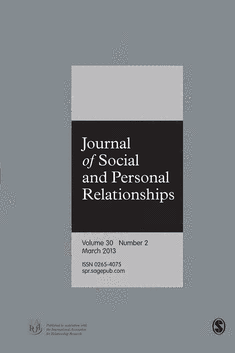
JOURNAL OF SOCIAL AND PERSONAL RELATIONSHIPS
Illuminating the Science of RelationshipsJOURNAL OF SOCIAL AND PERSONAL RELATIONSHIPS, published by SAGE PUBLICATIONS LTD, is a leading interdisciplinary journal dedicated to advancing the understanding of human relationships across various contexts. Since its inception in 1984, this esteemed journal has contributed significantly to the fields of communication, sociology, social psychology, and developmental psychology, maintaining a robust academic reputation evidenced by its impressive rankings—Q1 for Communication and Social Psychology for 2023 and Q2 for Developmental and Educational Psychology. With its commitment to high-quality research, it offers valuable insights into how relationships shape our personal and social worlds, addressing critical topics that underpin human interaction. Though not an open-access journal, it provides accessible options for institutions and individuals committed to exploring complex relational dynamics. Researchers, practitioners, and students alike will find in this journal an indispensable resource for fostering deeper knowledge and dialogue around interpersonal relationships, making it a cornerstone of social sciences scholarship.
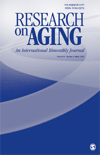
RESEARCH ON AGING
Illuminating the path to understanding gerontology.RESEARCH ON AGING is a renowned academic journal dedicated to advancing the knowledge and understanding of aging and its multifaceted effects on health, society, and psychology. Published by SAGE PUBLICATIONS INC, this journal has been a pivotal resource since its inception in 1979, disseminating cutting-edge research and insights that shape the field of gerontology. With a commendable impact factor and esteemed rankings in Geriatrics and Gerontology (Q2), Health (social science) (Q1), and Social Psychology (Q2), it positions itself at the forefront of ongoing dialogues in these critical areas. The journal appeals to a diverse audience, including researchers, healthcare professionals, and students, who seek to explore the complexities of aging. Though access is not available through Open Access, RESEARCH ON AGING continues to be an essential platform for impactful research and multidisciplinary discussion, making it an invaluable asset for anyone interested in the social and health-related dimensions of aging through to 2024 and beyond.

Chinese Journal of Sociology
Illuminating Contemporary Social Structures and Behaviors.The Chinese Journal of Sociology, published by SAGE Publications Ltd, is a leading venue for research in the field of sociology, with a focus on contemporary social issues within and beyond China. Since its establishment in 2015, the journal has gained a reputation for its rigorous peer-reviewed articles, contributing significantly to scholarly discourse and understanding of social dynamics in a rapidly changing world. With an impressive Q2 category ranking in Social Sciences and a solid Scopus rank of #111 out of 275, it serves as an essential resource for researchers, professionals, and students keen to explore the complexities of social structures and behaviors. Although not an open access journal, it offers access to a wealth of knowledge and insights, underlining its importance in the academic community. Located in the United Kingdom, the journal strives to foster interdisciplinary collaborations and highlight diverse perspectives, making it an invaluable platform for social science scholarship dedicated to advancing our understanding of the societal landscape.
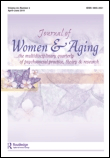
JOURNAL OF WOMEN & AGING
Innovating Perspectives on Aging and Gender StudiesJournal of Women & Aging, published by Routledge Journals, Taylor & Francis Ltd, stands as a pivotal resource in the interdisciplinary study of women’s health and gerontology. With a rich history since its inception in 1989 and an impressive convergence period extending to 2024, this journal addresses critical issues affecting women as they age, exploring topics that span from social policy to health care and psychological well-being. As a recognized publication in the fields of Gender Studies (Q2) and Geriatrics and Gerontology (Q3), it ranks favorably in Scopus, highlighting its commitment to advancing research and knowledge in these significant areas. Researchers, professionals, and students alike will find valuable insights within its pages as the journal seeks to promote understanding and foster discussion on the unique challenges and contributions of older women in society.
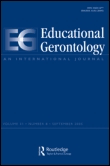
EDUCATIONAL GERONTOLOGY
Advancing knowledge at the intersection of education and aging.EDUCATIONAL GERONTOLOGY, published by Taylor & Francis Inc, is a leading academic journal dedicated to the study of education and aging. With an ISSN of 0360-1277 and an E-ISSN of 1521-0472, this journal has been an essential resource since its inception in 1976, continuing to provide invaluable insights until 2024. As an authoritative platform in the fields of Education and Gerontology, it ranks in the Q2 category for Education and Q3 in Geriatrics and Gerontology, reflecting its significant contribution to these domains. The journal is well-regarded for its rigorous peer-reviewed articles that explore innovative educational practices for older adults and address the challenges faced by this demographic. Researchers, professionals, and students alike can benefit from the multidisciplinary approaches and comprehensive research findings presented within its pages, making it a vital tool for advancing knowledge and practice in educational gerontology.

Advances in Life Course Research
Transforming Understanding of Life's Stages and ChangesAdvances in Life Course Research, published by Elsevier Sciences Ltd, stands at the forefront of the Life-span and Life-course Studies field. With an impressive 2023 Scopus ranking of 15 out of 63, placing it in the 76th percentile, this journal serves as a vital platform for researchers and practitioners alike to explore the profound influences of life transitions and social change over time. Since its inception in the early 2000s, it has consistently provided high-quality, peer-reviewed articles that delve into the complexities of human development and aging, making significant contributions to our understanding of the life course perspective. Although it currently does not offer open access options, its esteemed Q2 category ranking within its discipline underscores its impact and relevance in social sciences. Researchers, professionals, and students are encouraged to engage with this journal to keep abreast of significant advancements and emerging trends in the study of life courses.

Journal of the Economics of Ageing
Unlocking the Economic Potential of an Ageing WorldJournal of the Economics of Ageing, published by ELSEVIER, is a leading international journal dedicated to exploring the economic aspects of ageing in the global context. With an ISSN of 2212-828X, it aims to provide a platform for innovative research that addresses the socio-economic implications of demographic shifts, particularly those related to life-span and life-course studies. Since its inception in 2013, the journal has rapidly established itself within the Q2 category in both the Economics and Econometrics and Life-span and Life-course Studies fields, reflecting its significant contribution to these disciplines. Based in the Netherlands, this journal is indexed with a respectable percentile ranking, such as 69th in Life-span and Life-course Studies, confirming its value to researchers and professionals alike. Committed to disseminating impactful research, the Journal of the Economics of Ageing ultimately seeks to influence policy and funding decisions that shape the future of ageing populations.